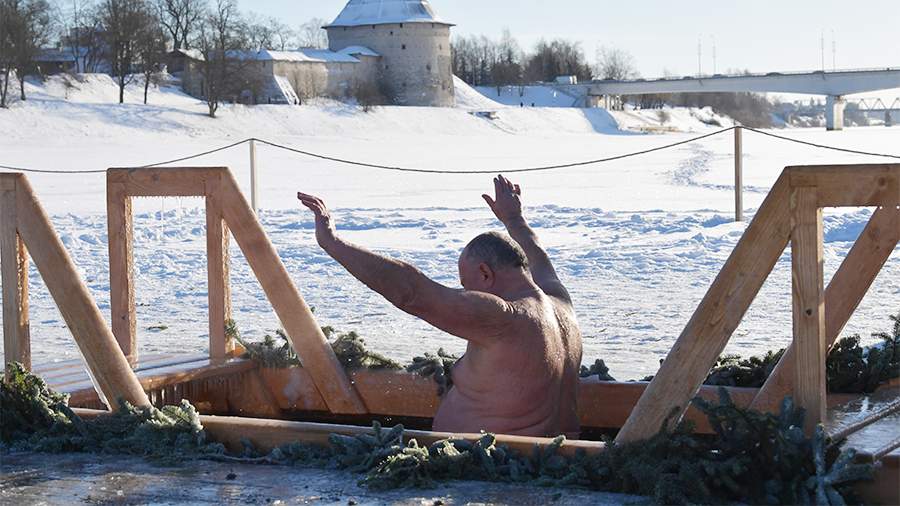Neurologist told about contraindications to bathing in an ice-hole
The Orthodox tradition of bathing in an ice-hole on Epiphany can be dangerous to health, especially if one does not prepare for it in advance. On January 14, neurologist Ekaterina Demyanovskaya, candidate of medical sciences, expert physician at Gemotest Laboratory, told Izvestia.
"Bathing in an ice-hole is a great stress for the body, and not everyone can test their endurance in this way. Undoubted contraindications for immersion are all types of arrhythmias, ischemic heart disease, poorly controlled arterial hypertension, diseases in which it is necessary to wear a pacemaker. People with such diagnoses in icy water can have vasospasm, which can provoke a heart attack or stroke", - emphasized the doctor.
According to her, it is all the more impossible to plunge into the ice-hole people who have already suffered these conditions in the past. Also contraindicated bathing in icy water people with respiratory diseases, including chronic: bronchitis, asthma, pneumonia, maxillary sinusitis, otitis media can be aggravated after hypothermia, the inflammatory process can be activated.
"Still contact with icy water and the resulting stress can adversely affect blood circulation and provoke fluctuations in glucose levels, and therefore, and with poorly controlled diabetes mellitus, it is better not to participate in baptismal bathing. It is contraindicated to take a dip in icy water for people with epilepsy, as a seizure attack may develop," the expert explained.
Demyanovskaya added that people with mental disorders, pregnant women and small children (up to five-seven years old) should also refrain from bathing in the ice-hole or consult a doctor beforehand: in these conditions the reaction to stress can be unpredictable, so in some cases it is better not to take risks. It is also important to get a doctor's approval for ice bathing for people with any chronic diseases, even in remission.
Neurologist noted that at the same time bathing in ice-hole can be attributed to a kind of hardening and for trained people it is even useful: it strengthens the immune system, trains the nervous system. But it is necessary to prepare for immersion in icy water, otherwise there is a great risk to get hypothermia, aggravation of chronic diseases and sharp narrowing of blood vessels, which can cause dizziness, fainting or even heart attack and stroke.
"It is best to prepare for baptismal bathing in advance: take regular contrast showers, gradually increasing the temperature difference, swim in the pool, doused with cold water. So you can learn to adapt to the cold, and immersion in the baptismal font will not be a big stress," - said the doctor.
Before going to the ice-hole, you need to think through every step: choose only approved and specially equipped place for bathing, understand where to remove outer clothing, how to enter the water, what then wipe, how to warm up. Dress in warm clothes that are easy to take off and put on, preferably in several layers. Be sure to take a thick terry towel and a thermos with a hot drink (eg, tea, mors), advised the expert.
Swim only in special bathing pools near the shore, equipped with a ladder for descent, near which are on duty lifeguards and ambulance.
"It is equally harmful to both come hungry and eat densely before bathing. It is best to have a snack 1.5-2 hours before the rite. In no case should not drink alcohol on this day: neither before nor after immersion in the ice-hole. Ethanol disturbs thermoregulation of the body and dilates vessels, which can lead to unfortunate consequences - from hypothermia to loss of consciousness right in the water. Also before diving should not smoke and use nicotine in any form," - warned the neurologist.
You should move quickly, but calmly. It is necessary to undress and warm up the body: make bends, waving arms and legs, squat - this will accelerate blood circulation and will not allow you to quickly freeze in icy water. Do not stand barefoot on the ice for a long time, it is better to remove shoes directly at the ice-hole, before immersion. If possible, it is desirable to be concerned about special shoes for bathing - it is better to choose a tight-fitting foot rubber or silicone slippers with thick non-slip sole. They will protect the feet from frostbite and will not let slip on the edge of the ice-hole, the doctor explained.
When descending, you need to hold on to the handrails, do not hurry. You can not dive, jump into the water from the edge of the font, it is undesirable to plunge with the head: in addition to the obvious danger of going under the ice, from a sharp temperature drop can happen loss of consciousness. In the ice-hole also should not linger, it is enough to spend 10-15 seconds in the water. Then it is necessary to quickly but calmly go on dry land, immediately go to a warm room, rub yourself with a towel, remove wet clothes and immediately dress in dry.
According to the expert, to warm up after the ice-hole, you can move around, drink a hot drink from a thermos, stay in a well-heated room. If after bathing dizziness or severe headache, heart palpitations, other unpleasant symptoms, it is necessary to consult a doctor as soon as possible.
The Russian Orthodox Church celebrates the Epiphany on January 19. On the night of Epiphany, many believers traditionally take a dip in the ice-hole.
Leading expert of the weather center "Phobos" Evgeny Tishkovets January 12 in his Telegram-channel reported that in the capital on Epiphany is expected to symbolic cooling to -5 degrees at night. During the day, the air temperature will be 0 degrees.
Переведено сервисом «Яндекс Переводчик»


